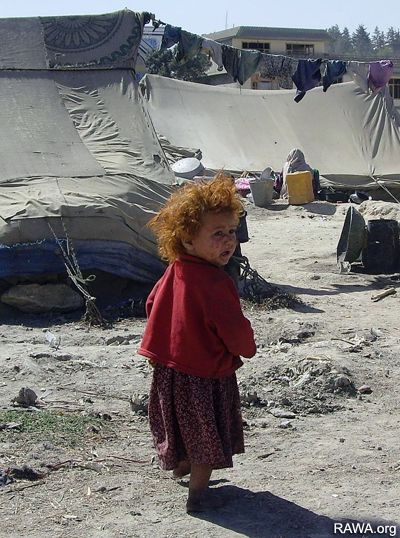KABUL - The UN Assistance Mission in Afghanistan (UNAMA) has condemned the hanging of a teenager boy by Taliban insurgents in Sangin District of volatile Helmand Province in southern Afghanistan.

Human rights organisations have expressed growing concerns about the impact of armed violence on Afghan children
"We share the revulsion of the Afghan people that children and young people are being targeted so cynically,” Aleem Siddique, a UNAMA spokesman, told IRIN on 2 October.
“This goes against all norms in Afghan society, is against international law and we condemn such actions unreservedly,” Siddique added.
On 30 September armed Taliban men hanged a 15-year-old boy on charges of espionage for foreign forces based in Afghanistan, said Ezatullah Mujahid, the administrator of Sangin District.
For hours the dead body of the boy was hanging from a tree with warning notes stuffed in his mouth ordering locals not to collaborate with foreign troops, according to Mujahid.
The teenager had US currency in his pockets and a notepad with several telephone numbers on it, and was immediately sentenced to death, Mujahid said.
A purported Taliban spokesman, Qari Yusuf Ahmadi, confirmed the incident, adding that anyone working for the government of Afghan President Hamid Karzai and his international supporters would face a similar fate.
Children targeted by Taliban
In the early morning of 2 October a suicide bomber blew himself up in front of a bus carrying Afghan police officers, west of Kabul. “The explosion killed 11 people including three children,” read a statement by Afghanistan’s Interior Ministry. The Taliban have reportedly claimed responsibility for the blast.
In another incident on 30 September two children died and five others were wounded in Khost Province after a bomb planted in a toy exploded, provincial officials said. Wazir Pacha, a provincial police spokesman, said the toy was purposely left in front of a house in Baak District. No group has claimed responsibility for the toy bombing so far.
Afghan officials and international forces based in the country have repeatedly accused Taliban rebels of using children and civilians as “human shields” in their ongoing insurgency. During a military operation in Uruzgan Province on 19 September, “Coalition forces as well as aircraft identified several insurgents in one compound using children as ‘human shields’”, said a US military press release.
On 15 June a suicide attacker blew himself up while schoolchildren were coming out of a school in Tarinkot, the provincial capital of Uruzgan Province, killing 11 children and wounding several others.
Armed men allegedly associated with Taliban insurgents have also frequently attacked schools, schoolchildren and teachers in insecure parts of the country. As a result, about 400 schools remain closed in southern provinces. Almost half of all Afghan children do not have access to basic education, according to Afghanistan’s Ministry of Education.
In April, Taliban insurgents circulated a video depicting a 12-year-old boy beheading a man who was allegedly accused of anti-Taliban activity. International human rights organisations, religious leaders and the government of Afghanistan expressed outrage and denounced the video.
Under international humanitarian law all warring parties must respect the safety of children and other civilians and avoid using them for military purposes.



